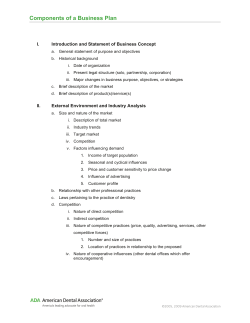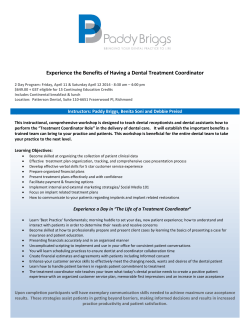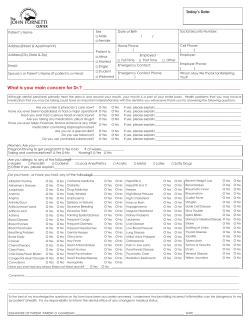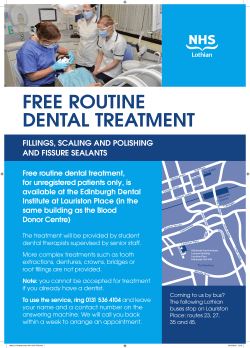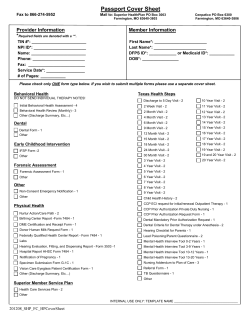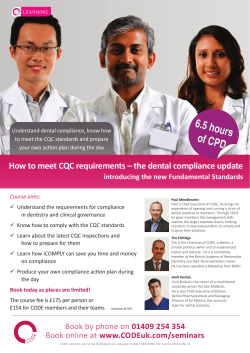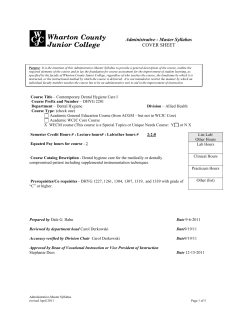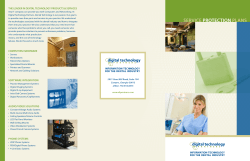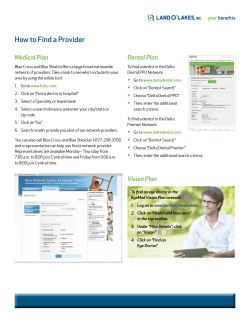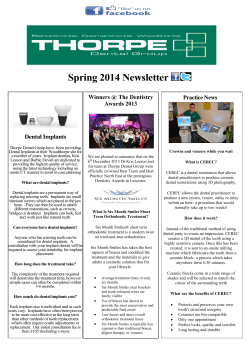
D H A
DENTAL HYGIENE APPLICATION INFORMATION Enclosed please find the following information, which may be used to apply for the Dental Hygiene. Table of Contents: General Information ...................................................................................................................................2 Dental Hygiene Program Goal and Program Objectives ...............................................................2 Program Outline and Course Information......................................................................................3 Admissions Requirements ...........................................................................................................................7 Minimum Requirements ..................................................................................................................7 Information Sheet .......................................................................................................................................8 Pre-requisite Guidelines .................................................................................................................8 Technical Standards for Dental Hygiene Students and Dental Hygienists.....................................8 Other Program Standards.............................................................................................................10 Application Deadlines...................................................................................................................11 Candidate Selection Criteria .....................................................................................................................11 Application Process ..................................................................................................................................12 Personal Check List ......................................................................................................................12 Dental Hygiene Application Packet Revised 10.15.14 Page 1 of 12 GENERAL INFORMATION The Dental Hygiene Program is accredited by the Commission on Dental Accreditation (CODA), a specialized accrediting body recognized by the United States Department of Education. dental hygiene students are allowed to take the written National Board Dental Hygiene Examination (NBDHE) when the dental hygiene program co-director has certified that the student is prepared for the examination and is within four months of anticipated issuance of a dental hygiene diploma. Upon successful completion of the NBDHE, graduates of the Dental Hygiene program are eligible to apply for and take state and / or regional clinical board examinations required for state licensure as a Registered Dental Hygienist.* CODA, which operates under the auspices of the American Dental Association, can be contacted at (312) 440-4653 or 211 East Chicago Avenue, Chicago, Illinois 60611. * Licensing requirements vary by state. Applicants are encouraged to be knowledgeable of the requirements of each state or states in which they are seeking licensure. Upon completion of the Dental Hygiene program and the general education requirements, the graduate will be eligible for an Associate of Science degree in Dental Hygiene from . offers the Dental Hygiene Program at three California campus locations. The first is in Visalia, located in the central valley. The second location is in Ontario, approximately 40 miles east of Los Angeles, and the third program option is near San Diego in Chula Vista just off Interstate 5. PROGRAM PURPOSE: The goal of the San Joaquin Valley College Dental Hygiene Program is to provide the student with knowledge, skills and experiences necessary to become a competent registered dental hygienist who desires professional growth and life-long learning. PROGRAM OUTCOMES: Upon completion of the dental hygiene program, the graduate will be able to: 1. Identify each patient’s physical and oral health status by collecting patient data through a process of comprehensive patient assessment procedures 2. Analyze assessment findings and use critical thinking in order to address the patient’s dental hygiene treatment needs 3. Establish a dental hygiene care plan that reflects the realistic goals and treatment strategies to facilitate optimal oral health 4. Provide patient-centered treatment and evidence-based care in a manner minimizing risk and optimizing oral health 5. Measure the extent to which goals identified in the dental hygiene care plan are achieved 6. Complete and accurately record all documentation relevant to patient care 7. Adapt to changes in demographics and cultural diversity in dental hygiene practice and health care delivery 8. Interact with the dental community and professional organizations for professional growth and lifelong learning Dental Hygiene Application Packet Revised 10.15.14 Page 2 of 12 DENTAL HYGIENE PROGRAM OUTLINE Class outline may vary based on start date and campus. TERM 1 Course Number DH DH DH DH DH DH DH DH DH Course Name Semester Units 10 110 11 111 12 112 13 14 114 Oral Biology Oral Biology Lab Oral Radiology Oral Radiology - Lab Head and Neck Anatomy Head and Neck Anatomy Lab Dental Health Education Introduction to Clinic Introduction to Clinic – Lab TOTAL TERM 1 3.0 NC 2.0 1.0 3.0 NC 2.0 2.0 2.0 15.0 20 120 21 22 123 24 124 26 Local Anesthesia Lecture Local Anesthesia Lab General and Oral Pathology Patient Management and Geriatrics Clinical Practice 1 Clinic Seminar 1 Clinic Seminar 1 – Lab Community Oral Health TOTAL TERM 2 1.0 1.0 4.0 2.0 3.0 1.0 1.0 2.0 15.0 DH DH DH DH DH 30 31 32 132 33 3.0 3.0 2.0 1.0 1.0 DH 133 DH DH 134 399 Periodontics 1 Pharmacology Dental Materials Dental Materials Lab Clinic Seminar 2 Advanced Clinical Topics Clinic Seminar 2 Lab Advanced Clinical Topics Lab Clinical Practice 2 Dental Hygiene Review Seminar 1 TOTAL TERM 3 4.0 NC 15.0 Periodontics 2 Clinical Seminar 3 Clinical Practice 3 Nutrition Legal and Ethical Responsibilities Dental Hygiene Review Seminar 2 TOTAL TERM 4 3.0 2.0 5.0 2.0 2.0 1.0 15.0 TERM 2 DH DH DH DH DH DH DH DH TERM 3 1.0 TERM 4 DH DH DH DH DH DH 4 42 143 45 46 499 TOTAL DENTAL HYGIENE PROGRAM 60.0 All dental hygiene students graduate at the end of Term 4 after successful completion of all program requirements. At this time, students receive an Associate’s of Science Degree in Dental Hygiene. Additional Didactic & Clinical Experience DH DH 601 602 Dental Hygiene Application Packet Revised 10.15.14 Dental Hygiene Review Dental Hygiene Clinical Experience NC NC Page 3 of 12 COURSE INFORMATION DH 10: ORAL BIOLOGY (3.0) DH 110: ORAL BIOLOGY LAB (NC) These courses cover the study of embryology and histology of oral structural formation, clinical recognition of normal oral structures, the physiological and structural functions of teeth and supporting tissues, and oral anatomy relative to proper dental hygiene procedures. DH 11: ORAL RADIOLOGY (2.0) DH 111: ORAL RADIOLOGY LAB. (1.0) These courses provide the didactic, laboratory and clinical learning experiences to enable the student to distinguish the normal anatomical features of the oral cavity as they appear radiographically. Normal and pathologic conditions, placing film for x-rays, and analyzing the quality of exposed radiographs will be covered. DH 12: HEAD & NECK ANATOMY (3.0) DH 112: HEAD & NECK ANATOMY LAB (NC) These courses cover the anatomical structures of the head and neck regions and relate these structures to the clinical practice of Dental Hygiene. DH 13: DENTAL HEALTH EDUCATION (2.0) This course covers the principles and practices of prevention and control of dental disease with emphasis, plaque control, motivation and chairside patient education. DH 14: INTRODUCTION TO CLINIC (2.0) DH 114: INTRODUCTION TO CLINIC LAB (2.0) These courses provide an introduction to the clinical procedures and skills needed to become a skilled and professional dental hygienist. The lab portion of this course is graded pass or fail. DH 20: LOCAL ANESTHESIA (1.0) DH 120: LOCAL ANESTHESIA LAB (1.0) These courses examine the pharmacology and physiology of local anesthetic agents and their proper use in dental hygiene therapy. The anatomy of the Trigeminal nerve, the physiology of nerve conduction and the mode of action of local anesthetic agents are included. Prevention and management of emergencies in the dental setting will be reviewed. The theory, rational and protocol for nitrous oxide/oxygen administration will be explored. Students will have opportunity to administer local anesthesia and nitrous oxide/oxygen in the laboratory setting. DH 21: GENERAL AND ORAL PATHOLOGY (4.0) This course examines the pathological processes of inflammation, immunology defense, degeneration, neoplasm, developmental disorders, healing and repair. Abnormalities in the human body with a special emphasis on normal and abnormal conditions in the oral cavity are covered. DH 22: PATIENT MANAGEMENT AND GERIATRICS (2.0) This course teaches the management of individual patients regarding age-related characteristics, as well as, those with medically compromised conditions. Aspects of motivation and interpersonal communication are presented. Dental Hygiene Application Packet Revised 10.15.14 Page 4 of 12 DH 123: CLINICAL PRACTICE 1 (3.0) This course provides the novice learner clinical experiences in the treatment of adults and children utilizing skills of oral inspection, cancer screening, dental and periodontal charting, radiographic technique, plaque control instructions, scaling, polishing and fluoride application. DH 24: CLINIC SEMINAR 1 (1.0) DH 124: CLINIC SEMINAR 1 LAB (1.0) These courses provide an expanded clinical learning experience through lectures and demonstrations. Items to be introduced are instrumentation using Gracey curet files, and ultrasonic instrumentation, management of medical emergencies and the Health Insurance Portability and Accountability Act of 1996. Items to be reviewed are principles of instrumentation, sharpening and ultrasonic scaling. DH 26: COMMUNITY ORAL HEALTH (2.0) This course introduces students to the principles and practices of dental public health. Emphasis is placed on the role of the dental hygienist as an innovator of, and an educator in, community health programs. Public health issues will be introduced and thoroughly discussed. DH 30: PERIODONTICS 1 (3.0) This course includes identification of the normal periodontium and recognition of deviations from normal; the etiology and principles of periodontal diseases, examination procedures, treatment and preventive measures. DH 31: PHARMACOLOGY (3.0) This course includes the classification and study of drugs according to origin, physical and chemical properties and the therapeutic effect and values, particularly of drugs used in dentistry. DH 32: DENTAL MATERIALS (2.0) DH 132: DENTAL MATERIALS LAB (1.0) These courses cover the composition and use of various materials used in dental procedures and the fundamentals of chairside assisting while using dental materials. The concepts of the entire dental team in performing responsibilities in the care of the oral dentition will also be covered. DH 33: CLINIC SEMINAR 2 (1.0) DH 133: CLINIC SEMINAR 2 LAB (1.0) These courses focus on soft tissue diagnosis and evaluation. The student will enhance clinical understanding of comprehensive periodontal treatment plans by preparing various treatment plans. Students will learn criteria for use of advanced instrumentation strategies, soft tissue management and post-treatment procedures for use on (or applicable to) periodontally involved cases. DH 134: CLINICAL PRACTICE 2 (4.0) This course provides the novice to beginner learner experience in the treatment of dental hygiene patients by expanding on the procedures and techniques introduced in earlier courses. This course is graded Pass or Fail. DH 399: DENTAL HYGIENE REVIEW SEMINAR 1 (NC) This course presents an overview of all dental hygiene theory for the purpose of National Board Exam review. Dental Hygiene Application Packet Revised 10.15.14 Page 5 of 12 DH 4: PERIODONTICS 2 (3.0) This course focuses on procedures applicable to the treatment of moderate to advanced periodontal disease, the maintenance of the periodontal patient, the assessment and treatment of periodontal emergencies, the ethical and clinical responsibilities in periodontal disorders, and the relationship and legal ramifications of Periodontics in the broad scope of dentistry. DH 42: CLINIC SEMINAR 3 (2.0) This course provides an expanded exposure to the clinical experience through development of case studies taken from the student’s personal clinical practice. Case studies will be presented in class to fellow students. Occasional guest speakers from the dental specialty fields will provide case presentations as well. DH 143: CLINICAL PRACTICE 3 (5.0) This course provides students the opportunity to become competent in the clinical skills learned and practiced in previous clinical courses and to prepare them for success on their state and national board examinations. DH 45: NUTRITION (2.0) This course provides the basic principles of nutrition and their relationship to dental health. Students will perform dietary surveys on clinic patients and plan nutritional dietary programs. DH 46: LEGAL AND ETHICAL RESPONSIBILITIES (2.0) This course looks at the ethical and legal considerations of practice in the field of dental hygiene. Fundamental factors, such as professional responsibility and decision making are addressed. This course covers the regulation of the practice of Dental Hygiene with the focus on the policies of the state dental practice act and the code of ethics of the American Dental Hygienists’ Association. DH 499: DENTAL HYGIENE REVIEW SEMINAR 2 (1.0) This course presents an overview of all dental hygiene theory for the purpose of National Board Exam review. Professional development and employment skills including resume writing, interview techniques, and personalized job search planning will be covered in this class. The final grade in this class includes projects and assignments related to professional development and employment skills. DH 601: DENTAL HYGIENE REVIEW (NC) This course focuses on review for the Dental Hygiene National Board Exam. Students will be required to complete some of the course through self-study and completion of assignments, pre and post- tests. This course is not a requirement for obtaining a degree in dental hygiene. (Pass/Fail) DH 602: DENTAL HYGIENE CLINICAL EXPERIENCE (NC) This course focuses on the clinical skills utilized during the State Dental Hygiene Exam. Patient selection, case management, and clinical practice are covered. Students may use approved extramural dental sites for their clinical portion of the class. Enrollment in this course is required for students to continue their clinical experience until the time of the California State Dental Hygiene Board Examination. Upon passing the California State Dental Hygiene Board Examination or showing satisfactory performance in the clinical setting, students will receive a passing grade. Enrollment in DH 602 may be extended through two additional California Dental Hygiene Board Examinations. This course is not a requirement for obtaining a degree in dental hygiene. (Pass/Fail) Dental Hygiene Application Packet Revised 10.15.14 Page 6 of 12 ADMISSIONS REQUIREMENTS MINIMUM REQUIREMENTS Admission to the Dental Hygiene Program includes the following specific minimum requirements: 1. As with all programs of , a High School Diploma or GED is required 2. The following prerequisite courses (see Information Sheet on next page for more details) must be completed at a regionally accredited college or university with a minimum of a “C” grade and an overall GPA of 2.75 or higher:* General/Inorganic Chemistry (with lab) Human Anatomy (with lab) General Microbiology (with lab) Writing and Composition Human Physiology (with lab) General Psychology Public Speaking or Oral Communication Organic/Biochemistry (with lab) Introduction to Sociology or Cultural Anthropology Intermediate Algebra or higher math* (will not be included in GPA calculations) 3. Science courses must have been completed within the past seven (7) years. 4. In order to perform the duties of a dental hygienist, dental hygiene students and practicing dental hygienists must meet certain technical standards.** 5. The applicant must request Official Transcripts from each college attended and must be received by the application deadline. In addition, applicants need to submit course descriptions from the college catalogues for the prerequisite courses. Many of these are now available on-line at the college websites. 6. Applicants must submit a personal statement on why they will be successful in completing the Dental Hygiene Program at . In this statement, the applicant must explain any grades of Ds, Fs or Ws in ANY previous college courses. The personal statement should be no more than a two (2) page document that is double-spaced and utilizes a 12-point, Times New Roman font. 7. In addition, applicants need to submit two letters of personal recommendation from previous employers, course instructors or personal references. Please Note: Only applicants meeting the above admissions requirements will be considered for an interview. * Advanced Placement (AP) courses do not qualify ** Please see Technical Standards for specific details Dental Hygiene Application Packet Revised 10.15.14 Page 7 of 12 INFORMATION SHEET PRE-REQUISITE GUIDELINES Where applicable it is recommended applicants use the California Articulation Numbers (CAN), as listed in course descriptions in California Community Colleges’ catalogues (see below for specifics) for prerequisite courses. Should the applicant have any questions regarding the acceptability of any course work beyond what is listed below, please contact the SJVC Dental Hygiene Admissions Advisor at the campus near you. General/Inorganic Chemistry (with lab) – CAN 6 Organic/Biochemistry (with lab) – CAN 8 General Microbiology (with lab) – CAN 14 Human Anatomy (with lab) – CAN 10 Human Physiology (with lab) – CAN 12 Writing and Composition – CAN 2 Speech/Oral Communication – CAN 4 General Psychology – CAN 2 Introduction to Sociology – CAN 2 Intermediate Algebra or higher math TECHNICAL STANDARDS FOR DENTAL HYGIENE STUDENTS AND DENTAL HYGIENISTS Technical standards provide a reference against which candidates for enrollment to the Dental Hygiene Program are evaluated by the Admissions Committee in the selection of students for the program. Successful candidates for the Dental Hygiene Program must have somatic sensation and functional use of the senses of vision and hearing. Additionally, applicants must have sufficient exteroceptive senses (touch, pain, temperature), sufficient proprioceptive senses (position, pressure, movement, stereognosis, vibratory) and sufficient motor function to permit them to carry out the activities described below. Applicants must be able to integrate all information received by whatever sense(s) employed, consistently, quickly and accurately, and must have intellectual ability to learn, integrate, analyze and synthesize data. A candidate for the dental hygiene profession must have the following abilities and skills: observation, communication, motor, intellectual-conceptual, integrative and quantitative, and behavior/social attributes. Technological compensation can be made for disabilities in certain areas, but candidates should be able to perform in a reasonably independent manner, with or without accommodation. Visual: Students in the dental hygiene program must have visual acuity sufficient to read millimeter measurements and to determine slight differences in anatomical structures, diagnostic tests, instruments and armamentarium. Dental Hygiene Application Packet Revised 10.15.14 Page 8 of 12 Oral-Auditory: Students must be able to communicate effectively and efficiently with patients and other members of the dental health care team. In an emergency situation, students must be able to understand and convey information essential for the safe and effective care of patients in a clear, unambiguous and rapid fashion. Students must also be able to relate information to and receive information in a caring and confidential manner. Motor: Students must possess the motor skills necessary to perform instrumentation around the teeth and structures in the oral cavity with hand and mechanical dental hygiene instruments. These skills require coordination of both gross and fine muscular movements, equilibrium and integrated use of the senses of touch and vision. Cognitive: Students must be able to measure, calculate, reason, analyze, integrate and synthesize in a timely fashion. Students must comprehend three dimensional relationships and understand the spatial relationships of structures. Social: Students must possess the emotional health required for the utilization of their intellectual abilities for the exercise of good judgment, for the prompt completion of all assessments and care of patients, and for the development of effective relationships with patients. Students must tolerate physically taxing workloads and function effectively under stress. They must be able to adapt to changing environments, display flexibility and learn to function in the face of uncertainties inherent in the clinical problems of patients. Curriculum Requirements: Students must be able to successfully complete, with or without accommodation, all required components of curriculum. Test and Evaluations: In order to evaluate the competence and quality of students, the Dental Hygiene Program employs periodic examinations as an essential component of the dental hygiene curriculum. Successful completion of these examinations is required of all students as a condition for continued progress through the curriculum. Reasonable accommodation will be made in the form or manner of administration of these evaluations where necessary. Clinical Assessment: Demonstration of clinical competence is also of fundamental importance to the career curriculum progression of the student. The process of faculty evaluation of clinical performance of students is an integral and essential part of the curriculum. Although reasonable accommodation will be made, participation in clinical experiences and the evaluation of the participation is required. Attendance: Class attendance is deemed an important component of the educational experience. Reasonable accommodation will be provided, but attendance requirements must be satisfied for successful completion of these courses. Evaluation and Accommodation of Disabilities: Although a candidate’s self identification as a person with a disability is voluntary, the Dental Hygiene Program can only accommodate known disabilities. In order to establish eligibility for and to request accommodation, a student must provide appropriate notice to the Dental Hygiene Program. Dental Hygiene Application Packet Revised 10.15.14 Page 9 of 12 The Dental Hygiene Program considers the well being of patients with whom the student will come in contact (both before and after graduation) of utmost importance. This well being must never be compromised by any policy of the Dental Hygiene Program. Patient care is a major concern of established requirements for physical, cognitive and emotional capabilities of students for admissions. does not discriminate on the basis of race, color, religion, national origin, sex, sexual orientation, handicap/disability, age, or Vietnam era/disabled veteran status in employment or in the application, admissions, participation, access and treatment of persons in instructional programs and activities. The Dental Hygiene Program will consider any qualified student who demonstrates the ability to acquire the knowledge necessary for the practice of dental hygiene, as well as the ability to perform, or learn to perform, the skills as described in this document. OTHER PROGRAM STANDARDS 1. Evidence of good physical and mental health as determined by a medical exam (a complete physical will be completed prior to the first week of class). 2. Hepatitis B vaccination will be initiated prior to the start of seeing clinical patients if not previously immunized. Patients with bloodborne infectious diseases and/or any other infectious disease will be treated in a safe and professional manner by dental hygiene students and staff. Confidentiality of information pertaining to the health status of each individual will be strictly maintained. A copy of the program’s policy on bloodborne pathogens is available upon request. Please note that the SJVC Dental Hygiene Program adheres to the CDC Guidelines for Bloodborne Pathogens. Candidates with a blood-borne condition that may compromise patient care should refer to these guidelines prior to applying (www.cdc.gov/). 3. All students involved with the direct provision of patient care must be continuously recognized/certified in basic life support procedures, including healthcare provider cardiopulmonary resuscitation with an Automated External Defibrillator (AED) approved by the American Red Cross or the American Heart Association. Students must provide a copy of current certification to be kept on file and will not be allowed to see clinic patients without a current CPR card on file. Dental Hygiene Application Packet Revised 10.15.14 Page 10 of 12 APPLICATION DEADLINES: The application deadlines for programs starting in 2014-2015 are listed below. Please note this deadline applies for receipt of all documentation: application, transcripts, personal statement, employment verification, and letters of recommendation. Program Start Date February 2, 2015 April 6, 2015 June 1, 2015 Application Deadline December 1, 2014 February 6, 2015 April 2, 2015 Campus Location Ontario San Diego Visalia Please Note: It is the policy of to require all prerequisite course work be completed and proof of such received by the time the program begins. Therefore, applicants who are unable to meet the course prerequisite requirements before this deadline cannot be offered a final acceptance. CANDIDATE SELECTION CRITERIA selects 30 students per class for the Dental Hygiene program. Selection is based on points earned in the following categories: 1. GPA on prerequisite courses (excluding mathematics) GPA 4.0 3.9 3.8 3.7 3.6 3.5 3.4 POINTS 45 44 43 42 41 40 38 GPA 3.3 3.2 3.1 3.0 2.9 2.8 2.75 Maximum Points Possible 45 points POINTS 36 34 32 30 28 26 24 2. Reading Comprehension Exam No previous dental knowledge is necessary to complete this examination. Applicants will complete this portion of the application process at the time of the personal interview. 20 points 3. Dental Health or Related Work Experience While dental health or related work experience is not a requirement to apply for the hygiene program, if you have completed an RDA or Dental Assisting program, if you are a licensed RDA, or if you have recent work experience in a dental office or related health setting, please complete the enclosed form documenting all previous related work experience. Verification of documented work experience may be conducted. 10 points 4. Personal Interview A personal interview will be conducted by a panel of staff and faculty. Applicants will be scheduled individually for this portion of the application process. 25 points TOTAL POINTS POSSIBLE: Dental Hygiene Application Packet Revised 10.15.14 100 POINTS Page 11 of 12 Personal CHECK-LIST APPLICATION PROCESS check when completed ______ 1. Complete the Application for Admissions and return it along with all required documents to by the application deadline. ______ 2. Copy of high school diploma / GED. ______ 3. The applicant must request Official Transcripts from each regionally accredited college or university attended. These can be included in the application package. Do not open the transcript; they must be kept in original sealed envelope. Official transcripts must be received by the application deadline. ______ 4. For ALL pre-requisite courses, include course descriptions, which are located in each college catalog of institution attended. ______ 5. Submit a complete listing of all related work experience. It is important to include all employment verification letters from each employer listed. Only those with proper verification will be credited toward work experience. Include this in the application package. ______ 6. Submit a Personal Statement. ______ 7. Submit two letters of recommendation. ______ 8. Meet the application deadline for the class you wish to apply for by making certain the college has received all transcripts and the completed application packet by the appropriate deadline. To be considered for an interview all documents must be received on time. ______ 9. Application packets will be reviewed by the selection committee. Selected applicants will be scheduled for a personal interview and reading comprehension examination. Please note: only applicants demonstrating the ability to succeed in the program based on past college work, experience and character reference will be selected for an interview; having a GPA of 2.75 on pre-requisite course work does NOT guarantee an interview. ______ 10. For additional information on how to apply, contact the Dental Hygiene Admissions Advisor at (866) 544-5017, or by email: Ontario Campus Lisa Alexander LisaA@sjvc.edu 4580 Ontario Mills Parkway Ontario, CA 91764 San Diego Campus Sarah FrostOkel Sarah.FrostOkel@sjvc.edu 333 H Street Chula Vista, CA 91910 Visalia Campus Sondra Jones Sondra.Jones@sjvc.edu 8344 W. Mineral King Visalia, CA 93291 OR Apply online at sjvc.edu Dental Hygiene Application Packet Revised 10.15.14 Page 12 of 12
© Copyright 2025
